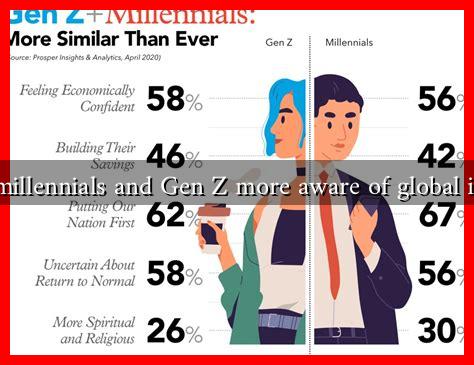-
Table of Contents
Are Millennials and Gen Z More Aware of Global Issues?
In recent years, the world has witnessed a significant shift in the way younger generations perceive and engage with global issues. Millennials (born approximately between 1981 and 1996) and Generation Z (born from 1997 onwards) are often characterized as being more socially conscious and globally aware than their predecessors. This article explores the extent of this awareness, the factors contributing to it, and the implications for the future.
The Rise of Global Awareness
Millennials and Gen Z have grown up in an era marked by rapid technological advancements and increased access to information. The internet and social media have played pivotal roles in shaping their understanding of global issues. Unlike previous generations, who relied on traditional media, these younger cohorts have access to a plethora of information sources, allowing them to stay informed about various global challenges.
Key Factors Contributing to Awareness
- Access to Information: The internet has democratized information, enabling young people to learn about global issues such as climate change, social justice, and economic inequality at their fingertips.
- Social Media Activism: Platforms like Twitter, Instagram, and TikTok have become powerful tools for advocacy, allowing young people to mobilize and raise awareness about pressing issues.
- Education: Many educational institutions have integrated global issues into their curricula, fostering a sense of responsibility and awareness among students.
- Globalization: Increased interconnectedness has made it impossible to ignore global challenges, as events in one part of the world can have far-reaching effects elsewhere.
Engagement with Global Issues
Millennials and Gen Z are not just aware of global issues; they are actively engaged in addressing them. This engagement manifests in various forms, including activism, consumer behavior, and political participation.
Activism and Advocacy
Young people today are at the forefront of numerous social movements. For instance:
- Climate Change: The Fridays for Future movement, initiated by Greta Thunberg, has mobilized millions of young people worldwide to demand action on climate change.
- Social Justice: Movements like Black Lives Matter have gained significant traction among younger generations, who use social media to amplify their voices and advocate for change.
- Gender Equality: The #MeToo movement has highlighted issues of sexual harassment and gender inequality, with young activists leading the charge for reform.
Consumer Behavior
Millennials and Gen Z are also making conscious choices as consumers, often prioritizing brands that align with their values. According to a study by McKinsey & Company, 67% of Gen Z consumers prefer to buy from brands that demonstrate social responsibility. This trend reflects a broader shift towards ethical consumption, where young people consider the impact of their purchases on global issues.
Statistics Highlighting Awareness
Several studies underscore the heightened awareness of global issues among Millennials and Gen Z:
- A 2021 survey by the Pew Research Center found that 70% of Gen Z respondents believe that climate change is a major threat to their generation.
- According to a report by BBC News, 60% of young people are willing to change their lifestyle to combat climate change.
- A study by Deloitte revealed that 83% of Millennials believe businesses should be actively involved in addressing social issues.
Conclusion
In conclusion, Millennials and Gen Z are indeed more aware of global issues than previous generations, driven by access to information, social media activism, and a strong sense of social responsibility. Their engagement in activism, ethical consumerism, and political participation reflects a commitment to creating a better world. As these generations continue to grow and influence society, their awareness and actions will likely shape the future landscape of global issues, making it imperative for policymakers and businesses to listen and respond to their concerns.

